Affiliate disclosure: This post may contain affiliate links. Please see our Privacy Policy.
Black raspberries have a unique flavor, capturing the deep earthy notes of a blackberry and combining it with the sweet brightness of a raspberry. Why on earth aren’t they more common in home gardens? Likely because black raspberries require specialized care and staking for optimal yields.
Somehow wild black raspberries manage to get along just fine without us. They may not produce huge yields on any one plant, but the plants grow in mass, meaning there’s plenty to go around. If you want to forage them wild, you’ll need a bit of patience. You can also try to tame your own wild black raspberry, and propagate it in your backyard.
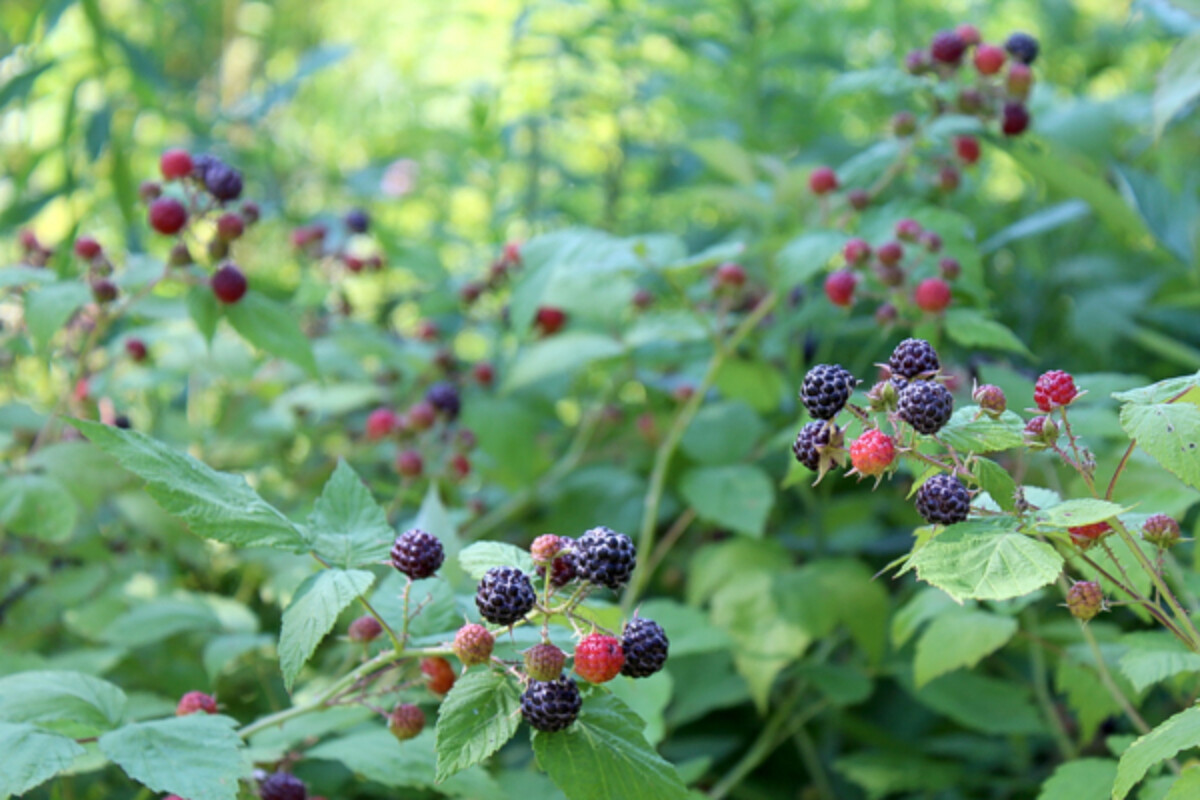
Foraging Wild Black Raspberries
Though the unripe fruit of a black raspberry plant looks somewhat like a cultivated raspberry, black raspberries are easy to identify if you look closely. They have a different growth pattern than standard raspberries.
While raspberries put off single canes, arching up from the ground, black raspberries come from a central leader. The central black raspberry stalk will branch out, producing fruit on side branches.
If you’re still confused, give those red fruits a gentle tug. If it’s a black raspberry plant, they won’t budge. They’ll also be hard and sour since they won’t fully ripen until they’re black.
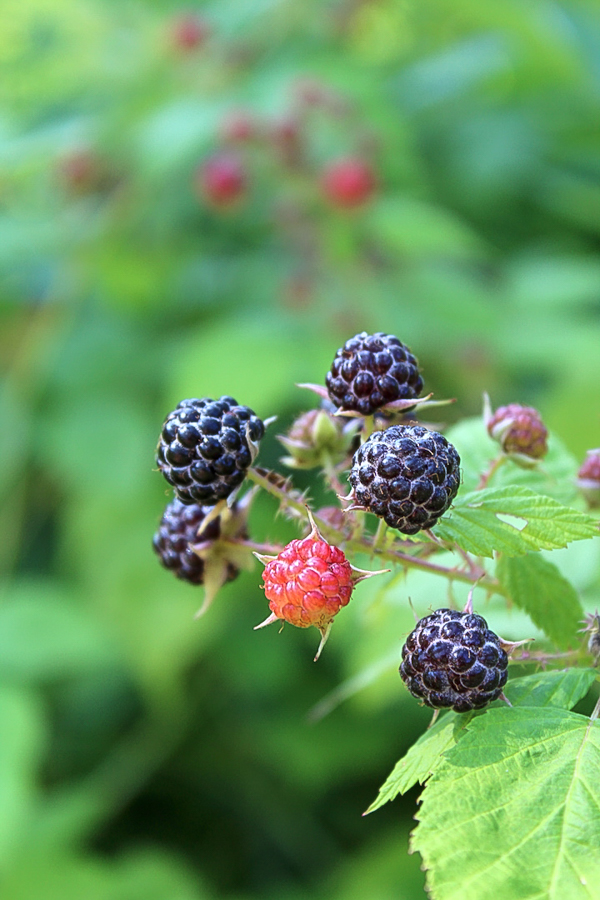
The fruit on black raspberry plants tends to ripen over an extended season, so it’s hard to harvest a large quantity of fully ripe berries. Especially when you’re popping all the best ones right into your mouth.
If you want to harvest enough for homemade black raspberry ice cream, you’ll likely have to pick a few that are slightly under-ripe. They’ll be firmer, and maybe a bit tarter, but still plenty sweet and flavorful.
Up here in zone 4 central Vermont, peak wild black raspberry season happens in mid to late July. In more southern latitudes, it’s likely a few weeks earlier.
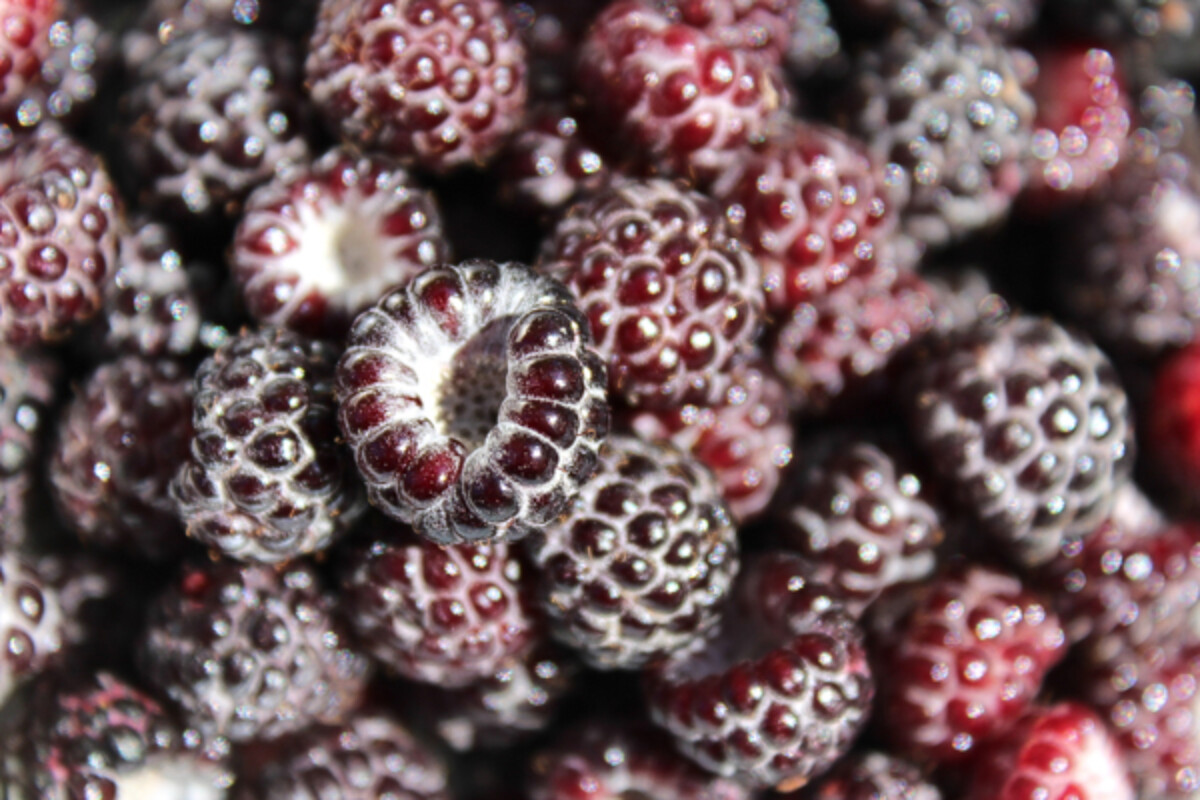
Taming Wild Black Rasberry Plants for Your Home Garden
If you happen to have wild black raspberry volunteers in a convenient spot, you can tame them by cleaning them up a bit. Simply cut back any old dried canes, lopping them off at ground level. New canes are green or a reddish-brown, while old canes are tan and look dry.
Sometimes black raspberries get really long and leggy, and you can stake black raspberries up, tying them to a central post. Ours put off long stray arching branches, and it’s ok to trim those back so they don’t catch your hair as you pass. Canes with trimmed tips will put out lateral branches which will bear good crops too.
If you’re transplanting black raspberries from the wild to your home garden, early spring through early summer is the best time. They’ll grow best in fertile, well-drained soil. They likely won’t bear their first summer after transplant, but you can expect a good crop every year after.
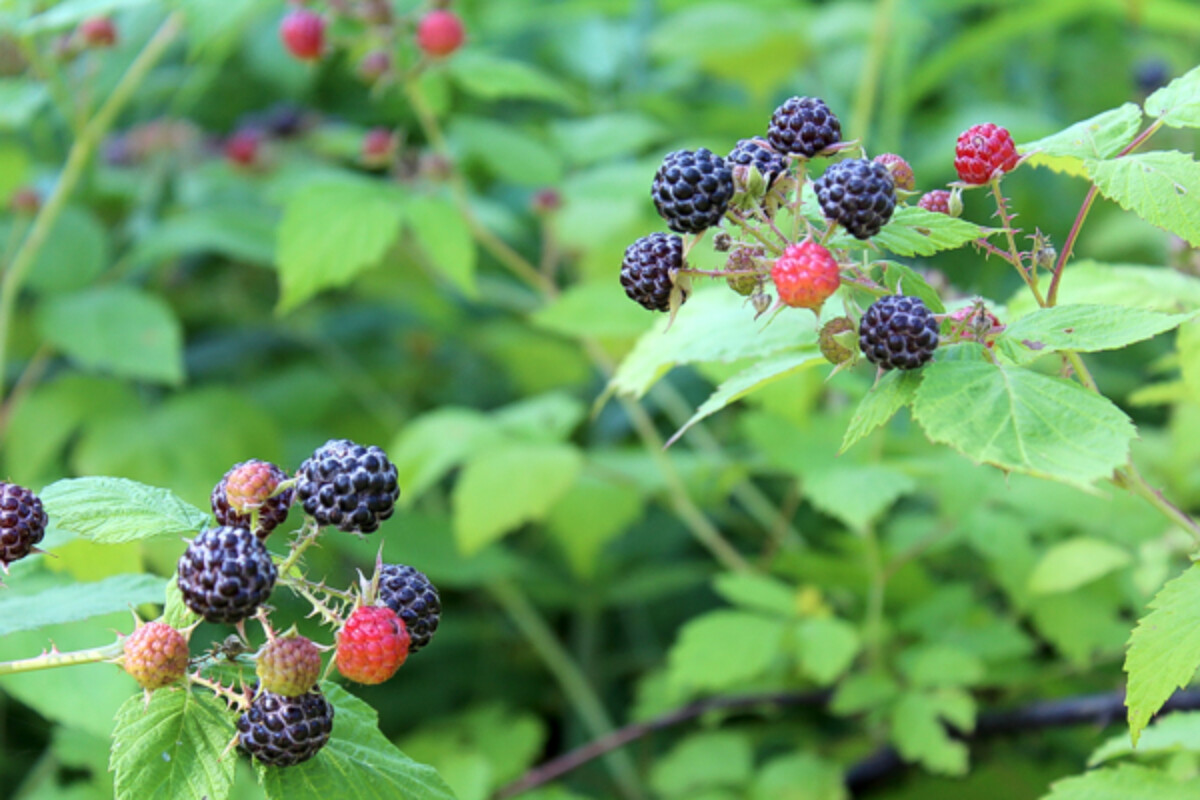
Keep in mind that wild black raspberry canes can carry viral plant diseases, so if you have cultivated raspberries be sure to keep them separated. Our tamed wild black raspberries tend to grow better than any cultivated plants, but perhaps we’re just lucky.
If you’re concerned about introducing disease into your raspberry patch, you can shop for certified disease-free black raspberry cultivars. The cultivated strain, called Jewel Black Raspberry, is known for great crops.
Once you’ve established your tamed black raspberry patch, they need to be pruned regularly and staked. While red raspberries grow in rows, black raspberries like to grow in hills with a single stake. Here are some detailed instructions on staking and pruning black raspberries.
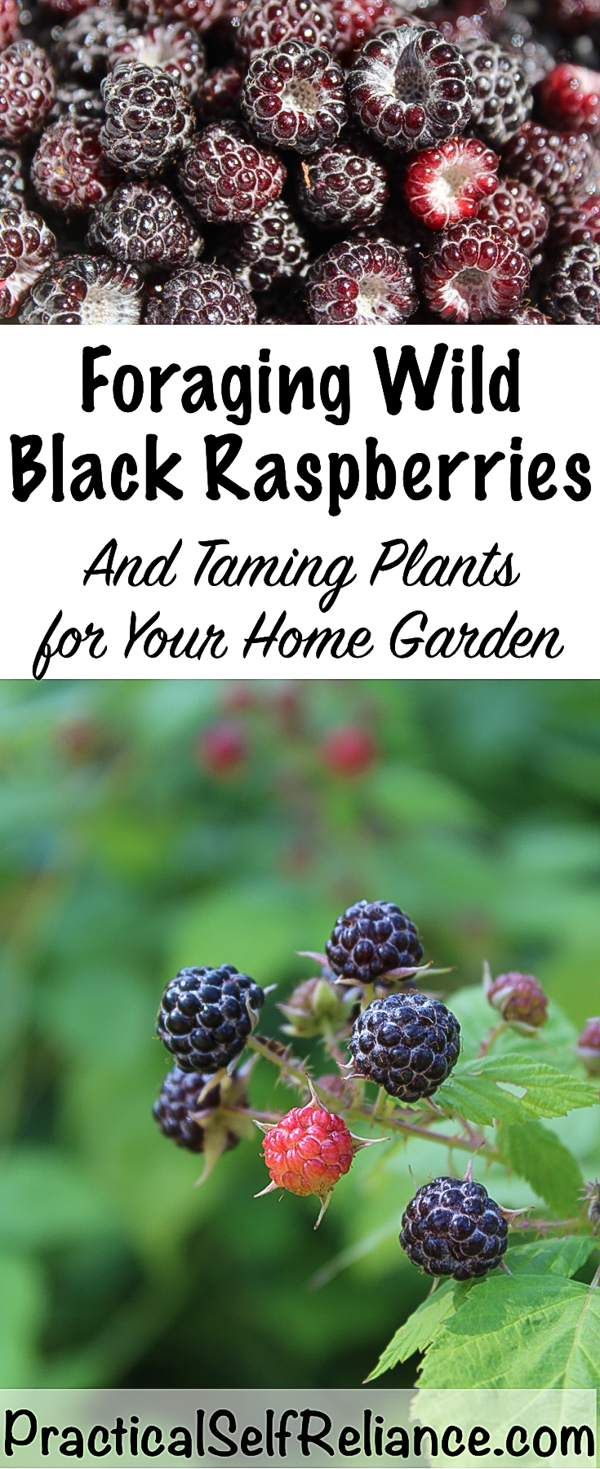
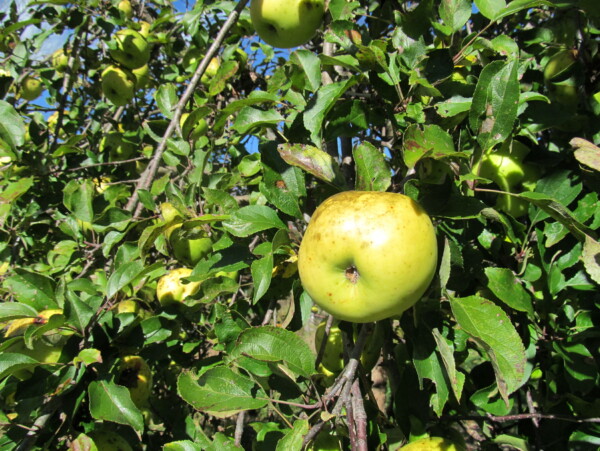
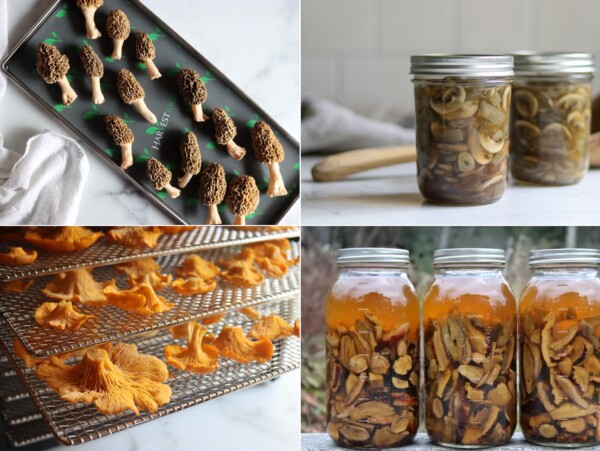
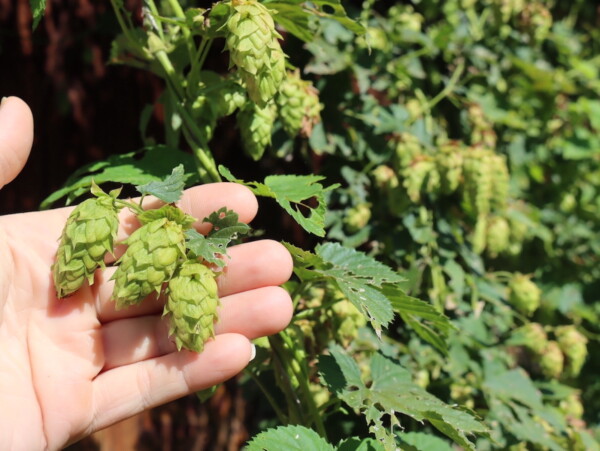
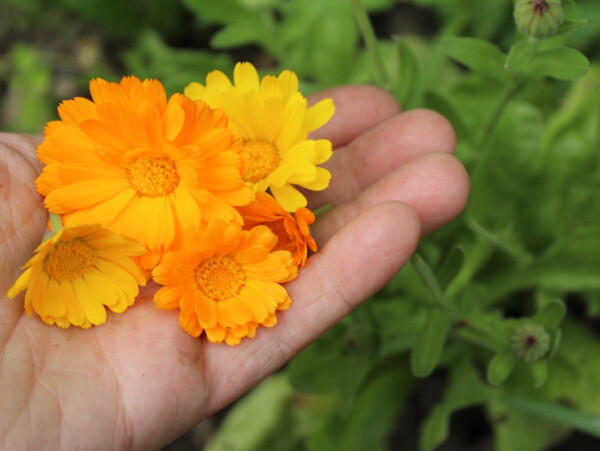










Hello!
I have property (we have a driveway and a camper, and spend summers there) in NW Wisconsin in the deep woods. We have tons of red raspberries, and curiously out by the gravel road are a huge plot of these black raspberries. The plants are literally taller than me. (I’m 5’9”) They’re on a different owner’s lot who hasn’t been at his property at all. I wasn’t sure what they were until I read your above post.
I’ve collected numerous red raspberries and made them into various things like tarts and ice cream toppings, but never have been able to gather enough black ones, because the plant is huge and somewhat unruly! I see the ripe berries but they’re waaayy inside the middle of this massive bush with sharp thorns. I’d like to see if I could grab enough this summer for a special treat. Any good ideas on capturing these berries?
Thank you in advance, Letitia
Wow, those are WAY bigger than ours. Most of ours are waist to chest high, and lower growing than other brambles. They also tend to grow outward from a central point, so the berries are not usually at the center of the bush. You’ve got a unique one there! I have seen people make hooked canes out of small diameter pvc pipe and use that to pull the brambles closer to picking. Maybe that could help?
Hi. I am so glad to have found your posts! Thanks for your efforts. We had a huge blackberry bush(?) that grew out of no where in the side of our yard. It produced over 2 gallons of berries. We made several quarts of jelly that was delicious. We were also given a dozen red raspberry canes I planted in the side yard as well. I was surprised at how prolific they were for a first year crop. You mention the possibility of diseases from the black berries crossing into the red raspberry canes. Should I remove the blackberry plants from the area, or since they each seemed fine, leave them alone? I am tempted to move the blackberries to the opposite side of the house. Advice? Thanks again for your foraging and gardening tips, they are so appreciated.
If you have another location that you can move them to, it may not hurt to go ahead and move them.
I have lots of wild black raspberries in my yard this year. They seem to be dark enough to pick but they don’t have much flavor. Do I need to leave them longer? I don’t want the birds to get them all!
Ours also have absolutely no flavor this year! We’ve had unbelievable amounts of rain this week though, and when you get lots of rain right as their ripening it washes the flavor out. They don’t concentrate sugars like they normally would. If they’re dark black, they’re not going to get sweeter, they’ll only get soft and unappealing from there.
Very helpful information for harvesting this wonderful wild black raspberry… the berry of the Gods, and my favorite since childhood growing up in rural Ohio!
Thank you. We’re so glad you enjoyed the post.
Does picking the berries annually encourage growth of larger berries in future years? (Central Virginia)
The best way to encourage larger berry growth is with proper pruning. There is a link at the end of the post that talks about exactly how to do that.
I’m enjoying the comments here. I grew up on a ranch in Northern California, where we had wild black raspberries, blackberries, huckleberries, etc., as well as some domestic varieties. They were wonderful. Now I live in rural south-central Pennsylvania. Here we have good wild black caps, and also wineberries–a raspberry like fruit much like the thimbleberries in the west. I really enjoy picking berries and have been doing so now for more than a month. I have put up several quarts to use during the rest of the year.
So glad you enjoyed the post. Thanks so much for sharing.
Can wild black raspberry plants be trimmed in fall? My wild berries grow next to my walkway and try to take over.
Yes. Trimming them actually invigorates them and causes them to go crazy sending out side shoots (and thus more fruit). If you trim them, I’d lop them right at the walkway, to cause them to send out shoots sideways (parallel with the walkway). Good luck!
I forage for these on my property every year for the past few years and make jams. This year I’ve noticed stands I’ve taken from in the past are totally or mostly gone. Have I over-foraged them reducing the seed stock, are they being killed off by something else, or are they just cyclical?
They’re really cyclical. We got hardly any berries last year, and this year the plants are loaded. They reproduce by runner quite a bit as well, and even if you’re picking heavily I imagine the birds are still getting their share. I can’t imagine you actually reduced wild seed stocks that much.
Hello,
I just discover wild black raspberries, along with blackberries in my backyard. The growth is enormous and the fruit is delicious. The area is very over grown and even has grape vine tangled in. My question is can I weed around them or should I wait til the end of season and just clear everything out so I can trellis next year?
Thanks
J
Either way, they’re so resilient I don’t think they’ll mind one way or the other.
Hey thanks for the info, I’m in WNY and they grow all over, but they’re not popular in stores or markets. I’m going to snag a few from the meadow I used to pick in growing up.
Just FYI the phrase “in mass” is French and spelled “en masse”. “In a mass” is also correct if you prefer to leave the french out of it 😉
Cheers!
Thanks for the clarification! 😊
I have these in my yard but I also have a something that grows low to the ground and produces larger berries. They look like wild raspberries and turn from red to black like the others, but I don’t know if they are edible.
Dewberries? To the best of my knowledge, there are no toxic raspberry look-alikes other than goldenseal fruit (which really doesn’t look like a raspberry, but google it). There are, however, hundreds of edible raspberry/blackberry species many of which grow low to the ground. Good luck, I hope you’re able to identify them.
I have an area that has some wild black raspberry and want to give it some new genetics. Can I sow seeds just by scattering them? All the instructional reads or video are about germinating and planting plants. I want to broadcast seed.